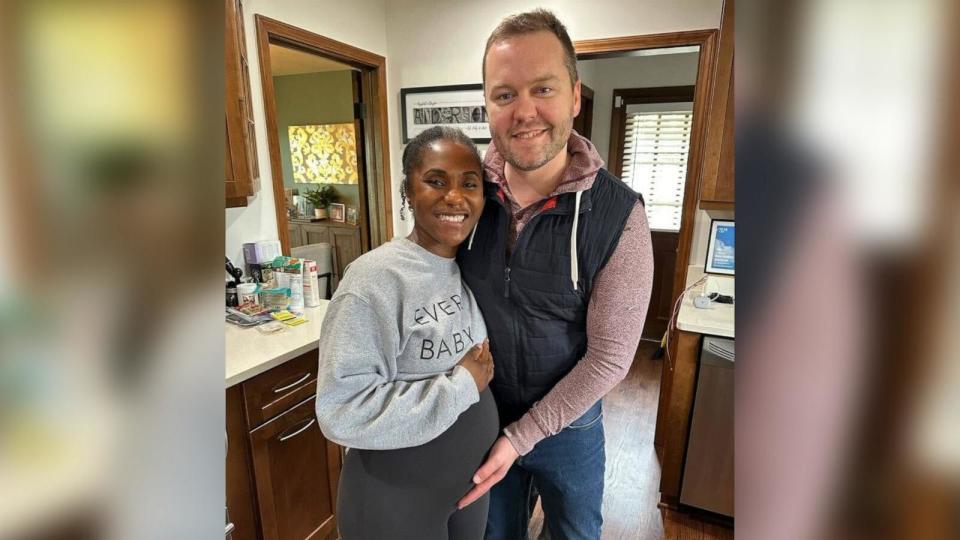When former Kansas City Chiefs cheerleader Krystal Anderson and husband Clayton Anderson found out Krystal was pregnant last November, the couple was elated and considered the news a message from their first child, James, who died in stillbirth in 2022.
“It was like our little sign from him that, ‘Hey, Mom, Dad, I got you. Don’t worry about it,'” said Clayton Anderson, in an interview with ABC News.
However, tragedy struck on March 20, when Krystal Anderson died of cardiac arrest caused by sepsis at 40 years old after another stillbirth, according to her husband and a death certificate.
Now, Clayton Anderson is speaking out about her tragic death, the loss of his child, and questions about maternal care he wants answered.

“She was my world… my best friend and obviously the love of my life and mother to our children,” said Clayton Anderson.
MORE: Woman calls for separate waiting rooms for those experiencing pregnancy loss
The Kansas City Chiefs cheer team posted an Instagram paying tribute to Anderson memorializing her “kind spirit, joyful energy, and her sparkle.”


‘Now it’s about saving you’
He said the couple was cautious going into the most recent pregnancy with Krystal Anderson having suffered a prior stillbirth in November 2022. So in February of 2023, she underwent a procedure to remove fibroids which are muscular tumors that grow in the wall of the uterus, according to the National Institutes of Health.
This move was taken to mitigate the chances of another loss, Clayton Anderson said.
Krystal Anderson had a miscarriage scare in December, and her husband said he wished there was more that could have been done to protect her pregnancy.
“One of the issues that I guess I have with the system overall is Krystal is 40, and she’s Black, and we’d had a loss before, but even then they say you know, you can’t start a plan with maternal fetal medicine or the high-risk maternity doctors until you get to week 14,” he said.
In the 16th week, Krystal Anderson underwent a cerclage procedure to ensure the cervix could remain viable for the remainder of the pregnancy.
According to Clayton Anderson, after the procedure, they were told the doctors were taking the best possible preventative action. Her next visit was at week 20.
After complications in March, doctors planned to admit Krystal Anderson into a specialized hospital unit to handle a periviable birth if she could make it to 22 weeks.
Clayton Anderson said during the week 20 visit his wife began prescribed semi-bedrest for two weeks in order to reach the 22-week point. On Saturday, March 16, later in week 20, the couple rushed to the hospital after Krystal began to feel back pains, a symptom Clayton Anderson said her OB doctor told her could be a result of contractions and dehydration. After running tests, he said doctors found the presence of amniotic fluid and could not detect a heartbeat in the fetus by 9 pm on Saturday evening.


After the couple grieved the loss of their daughter, Charlotte Willow, for several hours, Krystal Anderson began to spike a fever and developed signs of severe sepsis.
Clayton Anderson said the doctors told him they gave Krystal an epidural and attempted to allow her to have a natural birth, but the move was not successful.
“‘We have to get Charlotte out of there,'” Clayton said doctors told the couple. “‘Because you’re not trending very well, and now it’s about saving you, mama.”
Anderson said she went into surgery early Sunday morning and returned on a ventilator and dialysis machine with kidney, liver, and lung failure. After two more surgeries and the appearance of a recovery, Anderson sent his and her parents home for the night on Tuesday night.
However, he called family back when her condition then took a turn for the worse and deteriorated further that evening. Krystal Anderson died early Wednesday morning, March 20, from sepsis-related complications.
The state of maternal health for Black women
Sepsis is caused by the body’s failed attempt to respond to an infection, according to the Centers for Disease Control.
Maternal sepsis, a life-threatening infection that leads to organ injury and failure during pregnancy, childbirth, or the post-partum period, disproportionately affects Black women, like Krystal Anderson. Black and Hispanic communities are more commonly associated with higher rates of morbidity and mortality in sepsis compared to the white population,” according to Healthcare, a medical journal published in the National Library of Medicine.
Experiencing septic shock post-pregnancy is far more common after a stillbirth compared to a live birth, according to a Stanford Medicine study published in the Obstetrics & Gynecology medical journal. “Women with stillbirth were 14 times more likely than women who had live births to go into shock or experience sepsis (a blood infection),” according to the study.
While grieving, Clayton Anderson said he is considering larger questions about the maternal healthcare system.
“All pregnancy is high risk, especially, moreso, when you’re a woman of color, or you’re older, and they should be treated that way from the start,” said Clayton Anderson.
MORE: Miscarriage and stillbirth: Everything you need to know but were too nervous to ask
Clayton Anderson also expressed frustration at the time between examination appointments, considering the nature of her pregnancy.
“Expecting somebody who’s had a loss to go four weeks in between seeing their care providers… That’s the same protocol that’s done for a 23-year-old that’s very healthy,” he said. “It can’t be a one-size-fits-all.”
AdventHealth Shawnee Mission, the hospital that cared for Krystal, could not provide specific details regarding patient care due to health privacy law — the Health Insurance Portability and Accountability Act, or HIPAA. However, the hospital provided a statement to ABC News when reached for comment.
“Our hearts are hurting in this tragic situation. We along with the independent providers who deliver care in our facilities strive to provide the best possible care to every patient based on their specific needs and circumstances. We extend our prayers and support to family members and loved ones experiencing the devastating loss of precious life,” read the statement.
Krystal’s legacy: ‘She would want her laughter to be spread’


At the time of her death, Krystal worked in healthcare technology alongside her husband and her longtime friend, cheer teammate, and co-worker, Shanna Adamic, at Oracle. Adamic told ABC News that in her work with healthcare technology, Anderson was a part of the team that was awarded a patent for technology used to find risks in postpartum hemorrhaging.
“You can’t deny the irony here,” said Adamic.
She also has questions about why sepsis is more prevalent in minority communities. “Why is it so disproportionately affecting Black women?” she asked.
Clayton Anderson said he hopes some of Krystal Anderson’s legacies include more Black women working in STEM, improved outcomes for Black women in pregnancy, and a rise in awareness around stillbirth pregnancies.
“Those are moms. And they may not have their babies with them. But they’re still mothers,” he said.
Adamic added that joy would be a word to describe her late friend.


“There’s one word that we all know describes Krissy,” she said. “That’s joy. And she would always say that. And so that’s part of that legacy, too.”
Anderson agreed that Krystal would want her legacy to be spread with optimism and positivity.
“She would want everything to shine and sparkle, and she would want her laughter to be spread,” he said. “This is terrible and tragic. And, you know, I don’t think she wanted to be the person to champion these causes. But if she was going to do it, she was going to do it with joy.”
Husband of former Kansas City Chiefs cheerleader who died after stillbirth speaks out on his loss, lingering questions originally appeared on goodmorningamerica.com
Source Agencies
